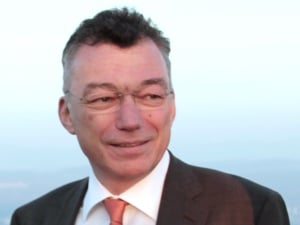“We shall make every possible effort to ensure that nuclear power plants throughout the world become safer”
In the aftermath of the reactor accident at Fukushima, the Swiss Federal Nuclear Safety Inspectorate (ENSI) has submitted a proposal to amend the Convention on Nuclear Safety (CNS). The proposal will be considered during the CNS Review Meeting taking place in Vienna from the end of March until early April. In this interview, ENSI Director General Hans Wanner explains the reasons that prompted the motion.

Switzerland is internationally active in advocating stronger safety requirements for nuclear plants. The Review Meeting of the Convention on Nuclear Safety (CNS) began this week. What is Switzerland doing in this area?
Hans Wanner: At the end of last year, we submitted a proposal to amend the Convention on Nuclear Safety which would require new nuclear power plants to be built in compliance with the latest safety standards and technologies. The safety of existing nuclear power plants should also be based on these standards. Accidents such as the one at Fukushima should simply not be allowed to happen any more. Accidents of this sort which render entire areas uninhabitable for lengthy periods are not acceptable.
Are there no requirements of this kind at present?
The Convention on Nuclear Safety only includes such requirements in a very general form. We consider it important that there should be a specific requirement for every country to report on its efforts regarding the safety of existing nuclear power plants once every three years. Open discussions on this aspect could then take place at the Review Meeting. No such requirement is in place as yet.
How do you estimate the chances of success for Switzerland with its current proposal for amending the CNS?
That’s difficult to say. At the moment, we are doing all we can here in Vienna to find as many like-minded parties as possible who will support our motion. Most countries agree with the general principles, but some nations consider that the process of amending the Convention involves too much time and effort. On the other hand, our requirements have already been put into actual practice by the member states of WENRA (the Western European Nuclear Regulators’ Association).
Given such prospects of success, why is Switzerland making this effort in the first place?
In our opinion, it is simply impossible to go back to “business as usual” now that three years have passed since the Fukushima accident. Chernobyl and Fukushima showed that accidents in nuclear power plants represent international challenges. This is why we must make every possible effort to enhance the safety of nuclear power plants worldwide.
The IAEA reacted after Fukushima and organised an extraordinary CNC Review Meeting in 2012, focusing on the reactor accident in Japan. ENSI also submitted proposals for amending the CNS at that time.
In 2012, we called for making review missions by international experts binding at the international level, and we advocated greater transparency. Instead of amending the Convention, the Review Meeting decided to set up a working group that would consider this issue and propose measures. We were participating and actively contributing to this working group. The outcome is a joint proposal for 42 measures aimed at improving the review procedure for the national reports. We are wholeheartedly supporting this joint proposal, but we nevertheless insist on our request to amend the Convention.
Where does Switzerland stand in terms of these requirements?
We already meet these requirements today. Regular review missions in the plants and also by us, the supervisory authority, have been taking place for many years. Moreover, current legislation already stipulates comprehensive periodic safety reviews (PSRs) that provide the basis on which existing plants must be backfitted in line with the latest developments in backfitting technology.

